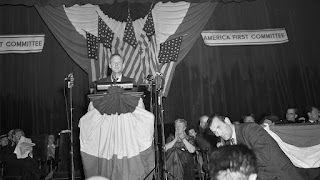Eighty years ago Colonel Lindbergh's mask slips
After months of being the most effective voice of isolationism and the leading figure in the America First movement against US involvement in the war, Colonel Lindbergh hero of the first solo flight across the Atlantic, let the mask slip to reveal publicly the hateful sub-text of his appeal. In a speech at Des Moines that was broadcast on the radio he denounced the “war agitators”: “three important groups have been pressing this country toward war: the British, the Jewish, the Roosevelt administration.” Some of his claims could have come from the mouth of Goebbels: the Jews’, “greatest danger to this country lies in their large ownership and influence in our motion pictures, our press, our radio and our government.” He claimed to admire both the British and Jewish races, but made it plain that he did not consider Jews to be American. He issued barely veiled threats, “Instead of agitating for war, the Jewish groups in this country should be opposing it in every possible way for they will be among the first to feel its consequence.” There was an instant storm of protest; Lindbergh’s claims not to be a Nazi supporter suddenly looked decidedly threadbare. The case of America First was badly undermined and the organisation’s committee actively discussed repudiating Lindbergh but decided against.
The German armies invading the Soviet Union achieved what can be considered their greatest success. Von Kleist’s 1st Panzer Group advancing from the South met Guderian’s 2nd Panzer Group coming from the North. This completed the encirclement of the city of Kiev in the Ukraine, trapping perhaps 460,000 Soviet troops, who continued to resist fiercely. Their fate, though, was sealed. It is reckoned to be the largest encirclement in the history of warfare.
The almost instant collapse of
Iranian resistance to the Anglo-Soviet invasion of the country was a fatal blow
to the prestige and standing of the Shah. Originally a professional soldier, he
had devoted huge resources to building up the army, but it had proved as good
as worthless. The British would have wanted to restore the previous dynasty,
but the claimant spoke no Persian, so they came up with a compromise. Reza Shah
would abdicate in favour of his 21 year-old son who would be the second and
last Shah of the Pahlavi dynasty. He went into exile, first in Mauritius then in South Africa, dying in 1944.
The Ministry of Food had good news for British consumers. Plentiful supplies – including imports from the US where consumption was supposedly being reduced voluntarily – meant that cheese would be easy to obtain. The onion harvest was also promising. Perhaps best of all, the price of potatoes was to be limited to one penny per pound, by the help of subsidies.



Comments
Post a Comment